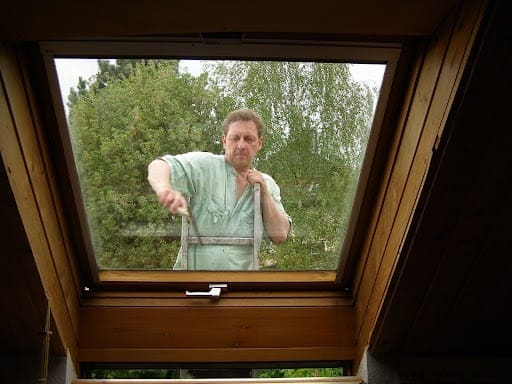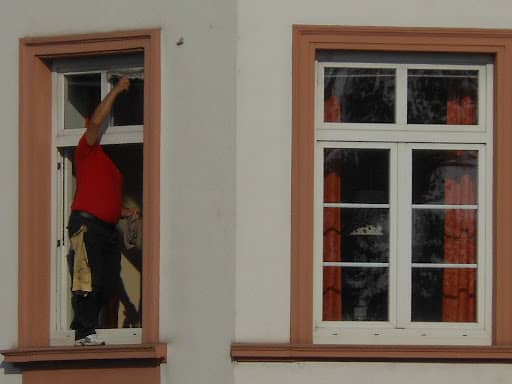You can clean your windows and other glass, chrome, or stainless steel surfaces easily and safely with a streak-free finish – without harmful chemical cleaners.
Some of the most-cleaned surfaces in most homes are the windows, storm doors, mirrors, and chrome or stainless steel surfaces.
This is especially true in homes where kids are constantly peeping out of windows or smudging fingerprints on mirrors, and pets are often sticking wet noses on patio doors.

Of course, these surfaces could be cleaned with Windex or another chemical glass cleaner. However, many parents of both children and fur babies prefer not to spray harsh chemicals where little hands and noses will be.
With that in mind, we’ve come up with a list of 6 easy ways to clean these surfaces without Windex, and leave them streak-free.
1. Choose the Right Weather Conditions
Would you believe that the weather can make a difference on whether or not these surfaces come as clean and shiny as you’d like? It’s true.
Here are a few tips for picking the right day to clean your windows, both inside and out.
- Sunny days are great for getting out of the house, but not so good for washing windows. The sun will dry the windows too quickly, causing them to streak.
- Don’t choose rainy days, either. Raindrops falling on your windows as you clean them will likely lead to spots.
- Cloudy days are best. On days when the sun isn’t shining brightly but there is no rain, your windows will dry streak-free and shiny.
2. Use Water for a Chemical-Free, Streak-Free Shine
While it may seem too simple to be true, water can be a very efficient glass cleaner.
- It won’t remove grime like window cleaning solutions will, but is good for those who regularly clean and do not have built-up dirt or greasy fingerprints.
- It is the least toxic option for cleaning windows, stainless steel, chrome, and glass.
- It is also the cheapest way to clean these surfaces.
- It is not a disinfectant, however. If you need to remove germs from a surface, you will need more than just water.
Simply spray clean water onto the windows or surface that you wish to clean and wipe with a lint-free paper towel.
3. Using Disinfectant Wipes to Clean Windows
If you do need to disinfect, this option may be a good one for you.
- Disinfectant wipes are quick for unexpected guests.
- They wipe away germs from sneezes, coughs, and touch.
- Clorox says that they are safe for “all household surfaces,” including glass, polyurethane treated wood, mirrors, glass, and shiny surfaces.
- Trying out a small test area first is recommended.
- These wipes kill 99.9% of household germs on surfaces.
And they are so easy to use that you won’t even need a spray bottle. Simply grab a wipe and wash away the dirt and bacteria.
4. Use a Squeegee
Squeegees are an awesome way to keep windows, mirrors, and flat surfaces clean.
- Mix dish soap with warm water in a bucket.
- Dip a non-abrasive sponge into the mixture and wipe it onto the surface that you wish to clean, leaving it wet.
- Use a squeegee to clean the soapy water off.
- Wipe the surface down with lint-free paper towels or soft, microfiber cloths.
It is important to note that the dishwashing liquid and water mixture should not be too soapy, or you will end up with streaks from bubbles.
5. Wipe Windows Down With Dryer Sheets
Another fast do-it-yourself cleaner for glass and shiny surfaces is a dryer sheet. In fact, many homeowners use these to clean their shower doors, mirror, and other surfaces.
- If you wipe surfaces down with unused dryer sheets, you will also have the benefit of a fresh, clean scent in your home.
- You can grab a dryer sheet and do a really quick touch-up to freshen the bathroom when you have unexpected company.
- Even used dryer sheets will work, but they will not have the scent that unused ones will.
6. Make Your Own Glass Cleaner
There are a number of homemade glass cleaners that can be used on these surfaces as well. You can mix and tweak the ingredients according to what your household needs are.
A – First-Time Window Wash Recipe
Materials:
- One cup of white vinegar
- A half teaspoon of dish liquid
- 2 cups of water
- An empty spray bottle
- Funnel
Instructions:
- Funnel one cup of vinegar into an empty spray bottle.
- Funnel in 2 cups of water.
- Add the dish liquid to the mix.
- Close the top of the spray bottle and shake the solution gently.
- Spray onto the windows or surfaces as you would any window cleaner.
- Wipe with lint-free paper towels or a microfiber towel.
- If needed, rinse with water.
This cleaning solution also works well for other surfaces, such as laminate flooring.
B – All-Purpose Cleaning Solution
Materials:
- A half cup of vinegar.
- 2 liters of water.
- A quarter cup baking soda.
- An empty spray bottle.
- A funnel.
Instructions:
- Funnel a half of a cup of vinegar into an empty spray bottle.
- Funnel in 2 liters of water. It is important that this step is the second one. If you skip it and add the baking soda without the water first, the mixture will erupt like a volcano.
- Slowly funnel in the baking soda.
Spray this solution on windows, chrome fixtures, mirrors, shower doors, patio doors, and anywhere that you have issues with hard water, mildew, grease, or stains.
This natural cleaning solution also gets rid of wax buildup, stinky smells, and more.
C – Heavy Duty Cleaning Solution

This is a great homemade cleaning solution to scrub away grime, mineral build-up, or other hard-to-clean dirt on your windows, chrome, mirrors, etc.
You might want to use it to deep clean, and then maintain your home with the Window Cleaner for Regular Use below.
Materials:
- A cup of distilled white vinegar.
- An empty spray bottle.
- A funnel.
Instructions:
- Funnel one cup of distilled white vinegar into an empty spray bottle.
- Shake well.
- Spray generously onto dirty, grimy surfaces and let it set for a few minutes.
- Wipe thoroughly with lint-free paper towels or a soft, microfiber cloth.
That’s correct, just plain, distilled white vinegar with no other ingredients makes an excellent hardcore cleaner.
For more stubborn issues on glass, you can warm the vinegar a bit; just don’t get it hot or it may shatter the glass.
For even harder-to-clean places where mold and mildew are issues you can add a bit of lemon juice.
D – Window Cleaner for Regular Use
You may know this cleaning solution as “the old vinegar standby cleaner.” This mixture has been used for many things over the years and remains popular among those who wish to clean green.
Materials:
- A cup of white vinegar.
- A cup of water.
- An empty spray bottle.
- A funnel.
Instructions:
- Funnel a cup of white vinegar into an empty spray bottle.
- Funnel in a cup of water.
- Shake the mixture well.
This solution can be sprayed onto windows, mirrors, and other surfaces for cleaning maintenance once you’ve deep-cleaned with something such as the Heavy Duty Cleaning Solution.
It will give your shiny surfaces a streak-free clean.
E – A More Natural Scented Window Cleaner
If you’d like a scented window cleaner that is more natural, instead of the harsh chemicals that can be in dryer sheets, this may be the recipe you’d like.
Materials:
- Undetermined amount of white vinegar, likely a cup or two.
- Enough citrus peels to fill a Mason jar.
- An empty Mason jar.
- Water.
- Empty spray bottle.
- Funnel.
Instructions:
- Cut citrus peels into strips and stuff them into the Mason jar until it is as full as you’d like.
- Pour the white vinegar into the jar until all of the space around the citrus peels is filled, and then seal the jar.
- Store the jar in a cool, dark place for about 2 to 3 weeks.
- Drain the vinegar from the citrus peels and throw away the peels.
- Add an amount of water to equal that of the vinegar solution.
- Funnel the mixture into a spray bottle and shake.
The more citrus peels that you use in this recipe, the less vinegar smell you will have.
You might also choose to add essential oils instead of the citrus peels. If you make that choice, you can skip the 2 to 3 week waiting period and use the mixture immediately.
Use as you would any other window cleaner.
FAQs on How To Clean Windows Without Windex
Are Homemade Window Cleaner Mixtures Safe For My Windows?
Yes they are. Many of them include ingredients that commercial cleaners would use too or alternatives for without all the chemicals. And to add to this, they are also environmentally friendly unlike most commercial cleaners.
Why Use White Vinegar For Cleaning?
It’s very acidic which makes it great to break down dirt and clean things. Also, it doesn’t have any coloring agents so it won’t stain the surface being cleaned.
